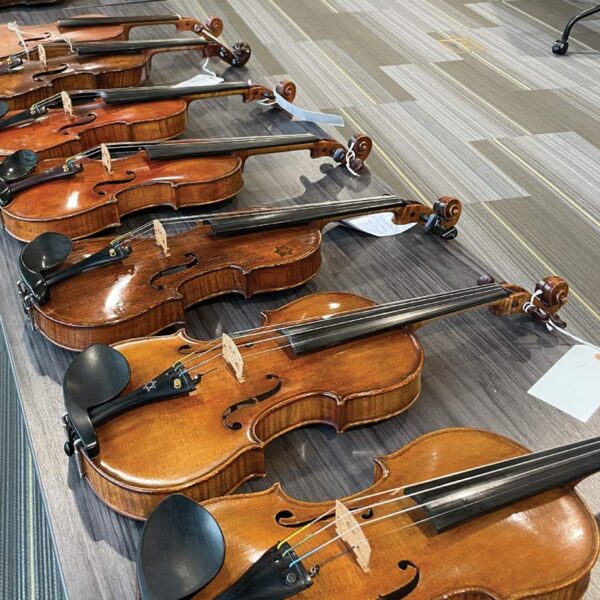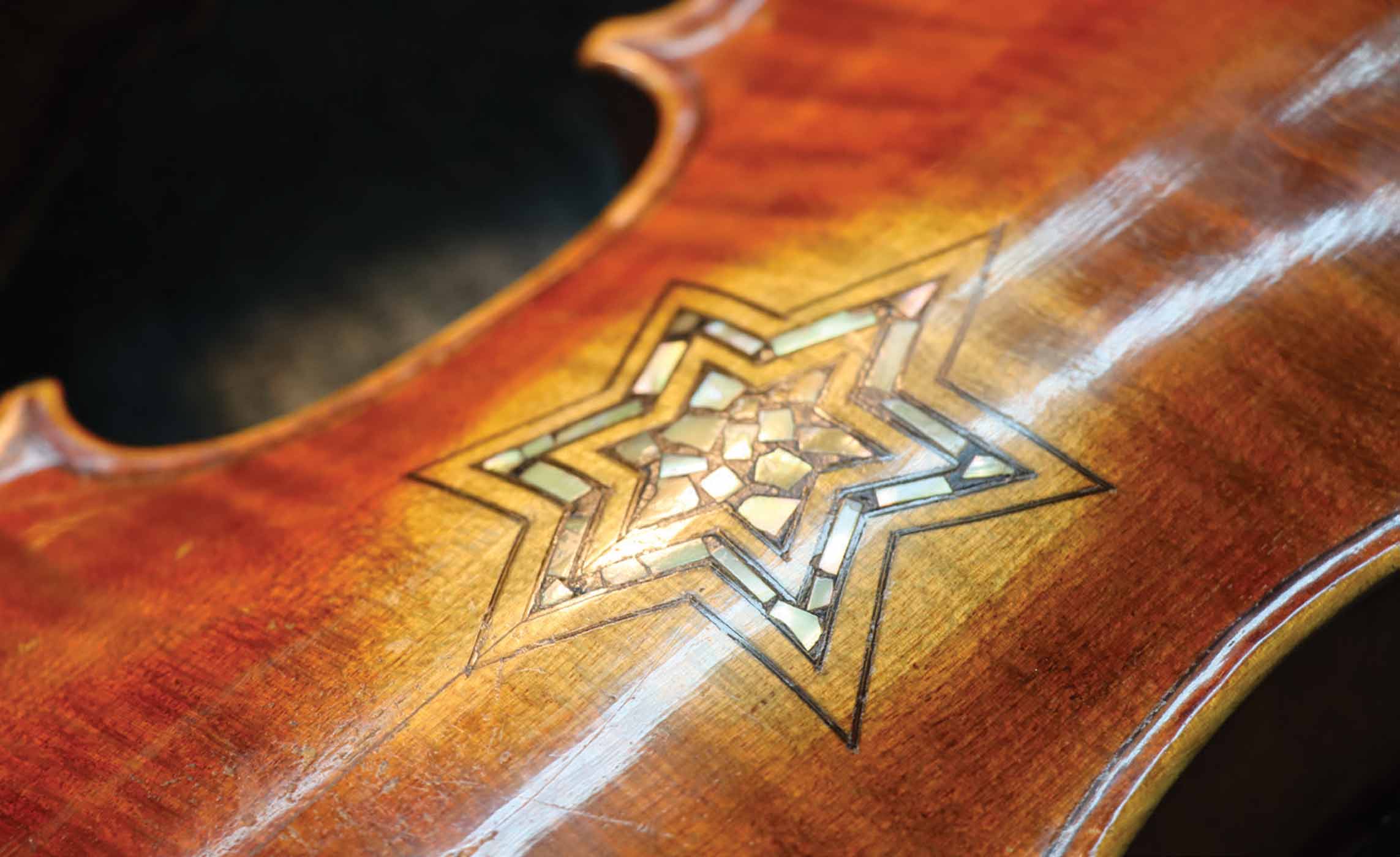VIOLINS OF HOPE
By Mitch Hurst
Restored violins that are played during the Violins of Hope performance in the Chicago area this summer.
By Mitch Hurst
Restored violins that are played during the Violins of Hope performance in the Chicago area this summer.

During World War II, Avshi Weinstein’s grandfather, Moshe, immigrated from the Jewish Ghetto in Vilna, Poland (what is now Vilnius, Lithuania) to Palestine. He had completed his studies at the Conservatory of Vilna and went to Palestine looking to find work as a musician. But at the time there was an abundance of qualified violinists, so Moshe took to repairing violins and cellos and opened a shop in Palestine in 1939.
Little did he know at the time that decision would be the start of a family legacy that would lead to educating thousands about the horrors of the Holocaust.
Moshe passed along his talents for repairing violins to his son, Amnon (Avshi’s father), and through a series of happy accidents ended up repairing more than 60 violins that Jews had held on to after the Holocaust. Many of the violins are adorned with a Star of David in the back.
“What happened is that after the war, people didn’t want to touch anything that was made in Germany,” Avshi says. “It was banned. and many of the musicians, they actually came from Germany and Austria, and they had very good German instruments.”
Avshi says we know today that most of the violin makers in Germany were not aligned with the Nazi Party, and that some of violin makers actually provided money for Jews to escape and provided shelter for Jews in their homes.
“They came to my grandfather, some of them after the war, and they sold him their violins, violas, and cellos,” Avshi says. “He didn’t want them to break the instruments, but it was basically a useless collection.”
In 1999, Amnon was invited by a prominent violin maker in Dresden to give a lecture in Germany about the instruments he was restoring, and their stories. After that, Amnon spoke on a radio show and put out a call for any instruments that were played during the war. It was similar to the tactic used after the war to locate relatives who may have survived the Holocaust and immigrated to Palestine.
“We knew there were musicians playing and there was music all over. The next day (after Amnon’s radio interview), we got the very first phone call from a person who had his uncle’s violin, a very unique violin,” Ashvi says. “It has a small Star of David in the back and the label is in Hebrew.”
That was the start of Violins of Hope, Amnon and Ashvi’s (who work from their shops in Tel Aviv and Istanbul, respectively) project to use the violins for performances and tell their stories to educate people of all ages about the Holocaust. Jewish Community Centers of Chicago (JCC Chicago) has brought the violins to the Midwest for a series of concerts and opportunities to hear their stories and their role in Jewish history.
“The first concert was actually in Istanbul in Turkey, done by a good friend of mine. And then we started doing more concerts with more instruments. Today we have over 100 instruments,” Ashvi says. “Now in Chicago, it’s basically the biggest project we have ever done, almost six months with more than 100 events, concerts, lectures, and exhibitions. It’s an amazing, project.”
Upcoming events on the North Shore include the Illinois Holocaust Museum and Education on May 7, New Trier High School on May 10, The Merion in Evanston on May 12 with the Evanston Symphony Orchestra, and again with Evanston Symphony Orchestra on May 14 at Pick-Stanger Concert Hall.
JCC Chicago is the biggest Jewish community center in the country, with centers from Lake County to Lakeview. It serves about 65,000 people annually, including 10,000 children, with a core mission of the caring and keeping of children and families, including what President and CEO Addie Goodman says, “Growing good kids.” She says with antisemitic violence on the rise, Violins of Hope brings a much-needed message to the Midwest.

“What we’re really trying to accomplish through Violins of Hope, not just a retelling of the Holocaust and the facts and data around it, but we’re really trying to amplify education, particularly for students, so that they have a true understanding of what happens if you don’t harness kindness,” Goodman says.
She says Illinois was the first state to mandate Holocaust education in public schools but only 50 percent of states have similar mandates, and it’s important for kids not just to have instruction but hands-on experience.
“You’re listening to the music. You can touch the instruments. Your friends in your own peer group are playing them because they take violin and they’re allowed to play them,” Goodman says. “This is our programmatic response to a really dramatic rise in antisemitism and hateful speech and actions. We just have to do something.”
Violins of Hope is a massive undertaking by JCC Chicago and, Goodman says, reflects the organization’s commitment to serving Chicago’s broad, diverse communities. The Chicago Violins of Hope program is the largest Violins of Hope project to date.
“Our hope is that we are really demonstrating for communities what meaningful education can look like. Most communities when they host the (Violins of Hope) event, it’s maybe 10 violin for two weeks on exhibit with one performance,” Goodman says. “That’s lovely, but you have a very limited imprint. We believe that we can reach a quarter of a million people between April and September through Violins of Hope in Chicago,”
Ashvi Weinstein mentions a recent performance in Livermore, California and a woman who came up to him in the parking lot afterword and told him of the impact Violins of Hope had on her daughter. It’s one person at a time, he says.
“She said, ‘Listen, my daughter is about 16 years old. The only thing she cares about in the world is TikTok. Last week before going to school, she mentioned she had a boring assembly, but at least she won’t have a mathematic lesson’,” Ashvi says. “When she came in the afternoon, she couldn’t stop talking about all the stories and the history she heard in the lecture at Violins of Hope. So, I know we got to at least one person.”
For more information about the Chicago Violins of Hope project, visit jccchicago.org. For more information about Amnon and Ashvi’s work, visit violins-of-hope.com.
Sign Up for the JWC Media Email